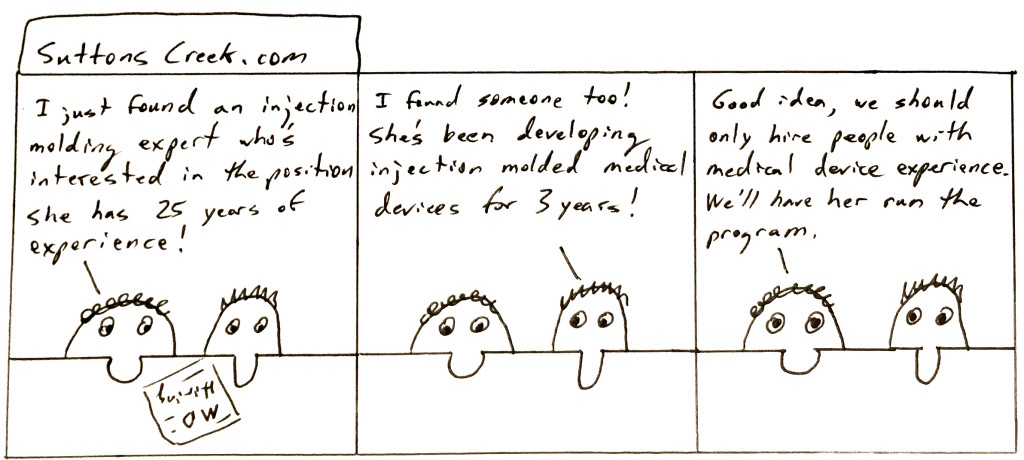Combination Product Industry News & Guidance
Sharing device-related information and wisdom that will help you succeedDid You Just Hire the Wrong Engineer?
Run a strong development team with systems engineering principles and you can hire better people, faster. That’s a major proposition for the pharmaceutical and medical device industries, who are having a hard time finding the right people for the job. “Medtech” should stop hiring only people from “Medtech”, which is a lot easier when you have a systems-driven practice in place.

Let’s review a few cases:
Pharma Company #1 is in the US, but can’ seem to find the right people to hire. They run about 30% contract staff, many from out of state. They claim they can’t find the quality of individual they are looking for, despite being surrounded by a mecca of engineering talent.
Pharma Company #2 is in the EU (Europe). They are running about 30-40% temp engineering staff. This is in part due to the rapid scale up in combination product activities after recent FDA regulations. There aren’t many medical device engineers in their area. They can’t find enough temp staff or employees to fill their ranks.
Pharma Company #3 is having a hard time finding talent. They’ve had so many challenges in recruiting, they’ve decided to create a satellite engineering group in another city. That city supposedly has more talent for hire. Contrast this with Pharma Company #1, who can’t seem to hire amidst the mecca of engineering.
Medical Device Company #4 just spent 8 months in live interviews with 12 candidates, and countless others before that cut, without making a single hire,
So what’s the common thread across these companies? They are all working in the medical device space and focused, almost entirely, on hiring medical device engineers. Is that optimal? No. Is that necessarily bad? Probably. These companies feel that they need a company full of medical device engineers to design a medical device correctly.
Wrong!
You don’t need a company full of medical device engineers to design a medical device correctly, you need a DevOps process that enables development personnel of many flavors to develop a medical device… safely and effectively… which I had to say for my colleagues at the FDA ;). Not everybody has to be a medical device expert!
So how does a systems engineering focus help solve this challenge? Medical device regulations such as CFR 820.30 tell us WHAT we have to do to develop a medical device correctly… but they don’t tell us HOW do develop a medical device effectively. That’s the core of systems engineering. It starts with disciplined processes for tech-feasibility, tech-development, architecture, requirements, verification, and interface definitions. Structure these processes and your teams correctly, and every engineer can work within their defined system bounds without need for being a medical device expert.
Limiting hires to only medical device experts is often a crutch for a weak development organization. That can have it’s time and place, and we’ve often been hired to improve or remediate programs by sheer force of expertise and strong execution… but the highest value programs are those to which we can apply systems engineering principles from the start… to develop an effective project, an effective organization, … a learning organization.
Apply systems engineering and your company can hire top talent from outside and inside your domain.
